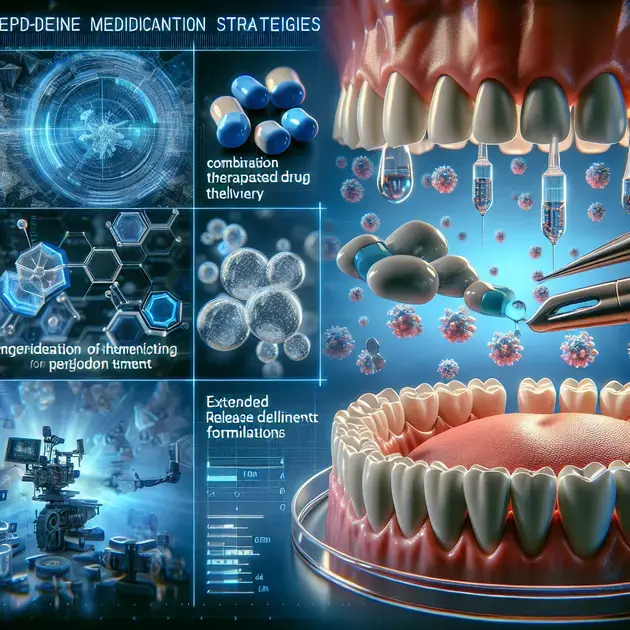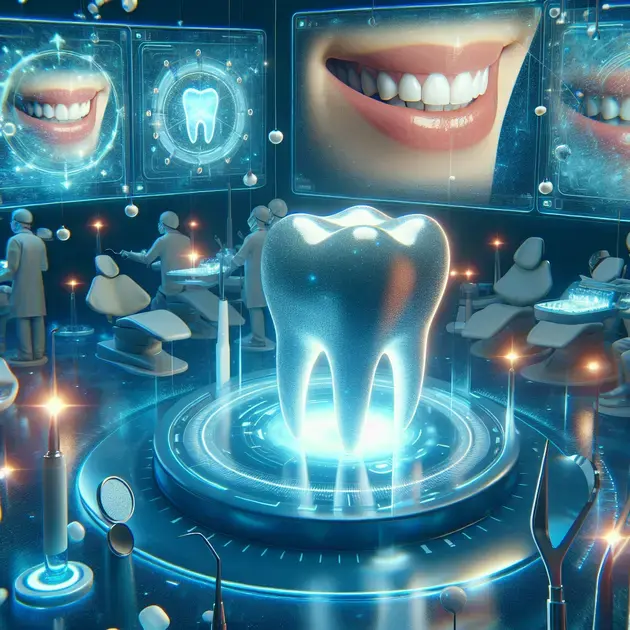When it comes to managing periodontal disease, effective medication plays a crucial role in treatment. From antibiotics to antimicrobial mouthwashes, there are various options available to help combat this common oral health issue.
Recent studies have shown the importance of using the right medication in conjunction with regular dental visits and proper oral hygiene practices to effectively manage periodontal disease and prevent further complications. With the right combination of medication and professional care, patients can experience improvements in their oral health and overall well-being.

Utilizing Antibiotics for Periodontal Disease Control
Antibiotics play a crucial role in controlling periodontal disease by helping to eliminate the bacteria causing the infection. To utilize antibiotics effectively for periodontal disease control, it is essential to first consult with a dental professional. They will assess your oral health and determine if antibiotics are necessary as part of your treatment plan. You can find valuable information on recommended antibiotics and their dosages on reputable medical websites such as Medscape or UpToDate.
Once prescribed antibiotics, it is important to follow the instructions provided by your dentist or healthcare provider carefully. Take the full course of antibiotics as directed, even if your symptoms improve before finishing the medication. This helps ensure that all harmful bacteria are eradicated to prevent a recurrence of periodontal disease.
In addition to taking antibiotics, maintaining good oral hygiene practices is essential for effective periodontal disease control. This includes brushing your teeth at least twice a day, flossing regularly, and attending regular dental check-ups for professional cleanings and monitoring of your oral health.
Monitor for any side effects while taking antibiotics and consult your dentist if you experience any adverse reactions. It is important to inform your healthcare provider of any other medications you may be taking to avoid potential drug interactions.
By utilizing antibiotics under the guidance of a dental professional and combining them with proper oral hygiene habits, you can effectively control and manage periodontal disease to maintain optimal oral health.
The Role of Antimicrobial Mouthwashes in Treatment
Antimicrobial mouthwashes are an important part of the treatment plan for various oral health issues, including periodontal disease. These mouthwashes contain active ingredients that help reduce the levels of harmful bacteria in the mouth, promoting a healthier oral environment. To utilize antimicrobial mouthwashes effectively in treatment, it is recommended to consult with your dentist or oral healthcare provider.
Your dentist can recommend a suitable antimicrobial mouthwash based on your specific oral health needs. You can also find a variety of antimicrobial mouthwashes available for purchase at your local pharmacy or online retailers such as Amazon or Walmart.
When using an antimicrobial mouthwash, follow the instructions provided on the product label carefully. Rinse your mouth with the recommended amount of mouthwash for the specified duration to allow the active ingredients to effectively target and reduce harmful bacteria.
Incorporate antimicrobial mouthwash into your daily oral hygiene routine, using it after brushing and flossing your teeth. Regular use of antimicrobial mouthwash can help maintain oral health, reduce plaque and gingivitis, and support the treatment of periodontal disease.
It is important to note that antimicrobial mouthwashes are not a substitute for proper brushing, flossing, and professional dental care. They are intended to complement your oral hygiene practices and treatment plan to achieve optimal oral health outcomes.
Optimizing Medication with Professional Dental Care
Optimizing medication with professional dental care is essential for effective management of oral health conditions, including periodontal disease. When prescribed medication as part of your treatment plan, it is important to coordinate with your dentist to ensure that the medication complements other dental interventions.
Professional dental care involves regular check-ups, cleanings, and treatment provided by a qualified dentist or dental hygienist. During these visits, your dentist can monitor your oral health status, assess the effectiveness of the prescribed medication, and make any necessary adjustments to optimize your treatment plan.
Communicate openly with your dentist about the medications you are taking, including any over-the-counter drugs or supplements. This information helps your dentist make informed decisions about your treatment and avoid any potential adverse drug interactions.
Follow-up appointments with your dentist are crucial to evaluate the progress of your treatment and make any necessary modifications. Your dentist may recommend changes to your medication, dosage adjustments, or additional interventions to enhance the effectiveness of your oral health care.
By combining medication with professional dental care, you can ensure comprehensive treatment of periodontal disease and other oral health conditions, leading to improved oral health outcomes and overall well-being.

Understanding the Role of Periodontal Medications
Periodontal medications play a crucial role in the treatment and management of gum diseases such as gingivitis and periodontitis. These medications are designed to target the underlying causes of these conditions, such as bacterial infections and inflammation, to help improve oral health outcomes. By understanding the role of periodontal medications, patients can work with their dental professionals to create effective treatment plans tailored to their specific needs.
One of the primary functions of periodontal medications is to reduce the growth of harmful bacteria in the oral cavity. These medications often contain antimicrobial agents that specifically target the bacteria responsible for causing gum disease. By inhibiting the growth of these bacteria, periodontal medications can help prevent the progression of gum disease and support the healing process.
In addition to combating bacterial infections, periodontal medications also help reduce inflammation in the gums. Inflammation is a common symptom of gum disease and can contribute to tissue damage and bone loss if left untreated. Medications that target inflammation can help alleviate these symptoms, promote healing, and improve overall gum health.
Another important aspect of periodontal medications is their role in supporting and enhancing the effects of professional dental cleanings and treatments. These medications can be used in conjunction with scaling and root planing procedures to help control infection, reduce inflammation, and promote the regeneration of healthy gum tissue. By incorporating medications into a comprehensive treatment plan, patients can achieve better long-term outcomes.
Overall, understanding the role of periodontal medications is essential for anyone dealing with gum disease. By working closely with a dental professional and following a prescribed medication regimen, patients can effectively manage their condition, improve their oral health, and prevent future complications.
The Benefits of Professional Dental Care in Medication Therapy
When it comes to treating gum disease and other oral health issues, professional dental care plays a vital role in medication therapy. Dental professionals have the expertise and resources to diagnose and treat gum disease effectively, including prescribing appropriate medications to manage symptoms and promote healing. By seeking professional dental care, patients can access the following benefits:
1. Accurate Diagnosis: Dental professionals can accurately diagnose the type and severity of gum disease through comprehensive examinations and diagnostic tests. This allows them to develop personalized treatment plans that may include medication therapy tailored to the patient’s specific needs.
2. Customized Treatment Plans: Professional dental care providers can create customized treatment plans that address the individual needs of each patient. These plans may involve a combination of professional cleanings, medications, and other therapies to effectively manage gum disease and promote optimal oral health.
3. Monitoring and Follow-Up: Dental professionals can closely monitor the progress of medication therapy and adjust treatment plans as needed to ensure optimal results. Regular follow-up appointments allow for ongoing evaluation of the patient’s oral health and the effectiveness of the prescribed medications.
4. Preventive Care: In addition to treating existing gum disease, professional dental care focuses on preventive measures to help patients maintain healthy gums and teeth in the long term. This may include education on proper oral hygiene practices, dietary recommendations, and routine dental cleanings to prevent future issues.
By recognizing the benefits of professional dental care in medication therapy, patients can take proactive steps to address gum disease and improve their overall oral health with the guidance and support of experienced dental professionals.
Enhancing Periodontal Treatment with Advanced Medication Strategies
As advancements in dental medicine continue to evolve, new medication strategies are emerging to enhance periodontal treatment and improve patient outcomes. These advanced medication strategies utilize innovative formulations, delivery methods, and treatment protocols to target the root causes of gum disease and promote more effective healing. By incorporating these strategies into comprehensive treatment plans, dental professionals can offer patients a higher level of care and support for their oral health needs.
One such advanced medication strategy involves the use of targeted drug delivery systems, such as medicated gels or mouthwashes, to deliver medications directly to the affected areas of the gums. This targeted approach helps maximize the efficacy of the medications while minimizing systemic side effects, resulting in more targeted and efficient treatment.
In addition to targeted drug delivery, advanced medication strategies may also include the use of combination therapies that combine different types of medications to achieve synergistic effects. By combining antimicrobial agents, anti-inflammatory drugs, and tissue-regenerating compounds, dental professionals can create customized treatment plans that address multiple aspects of gum disease and promote comprehensive healing.
Furthermore, advancements in medication technology have led to the development of long-lasting formulations that provide sustained release of medications over an extended period. These extended-release formulations offer convenience for patients by reducing the frequency of medication administration while ensuring continuous treatment efficacy for better long-term outcomes.
Overall, enhancing periodontal treatment with advanced medication strategies represents a promising approach to improving the management of gum disease and promoting better oral health. By staying informed about these innovative strategies and working with knowledgeable dental professionals, patients can access cutting-edge treatments that support their oral health needs effectively.
conclusão
Understanding the role of periodontal medications is essential for effective management of gum diseases like gingivitis and periodontitis. These medications target bacterial infections and inflammation, preventing disease progression and supporting healing. By working closely with dental professionals and following prescribed medication regimens, individuals can improve their oral health outcomes significantly.
The benefits of professional dental care in medication therapy are vast. From accurate diagnosis to customized treatment plans tailored to individual needs, dental professionals play a crucial role in managing gum disease effectively. Regular monitoring, follow-up appointments, and preventive care further contribute to maintaining healthy gums and teeth in the long term.
Enhancing periodontal treatment with advanced medication strategies shows promise in improving the management of gum disease and overall oral health. Utilizing innovative formulations, targeted drug delivery systems, and combination therapies can address multiple aspects of gum disease and promote comprehensive healing. By staying informed about these advancements and collaborating with experienced dental professionals, patients can access cutting-edge treatments to support their oral health needs effectively.



